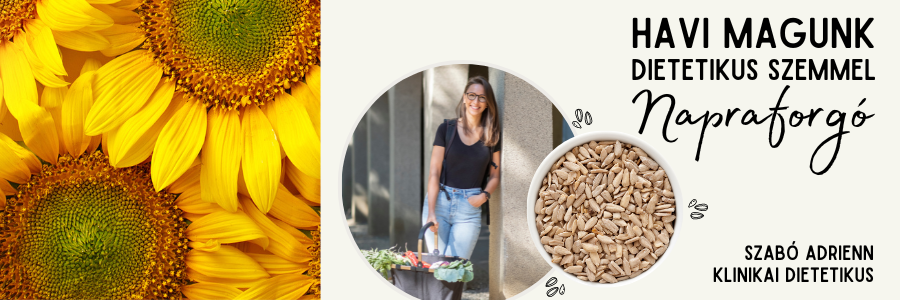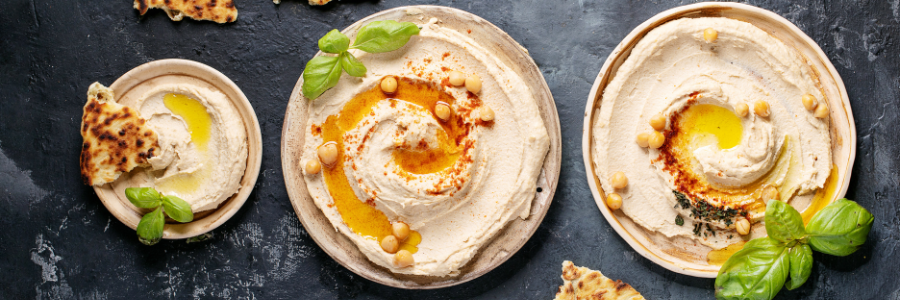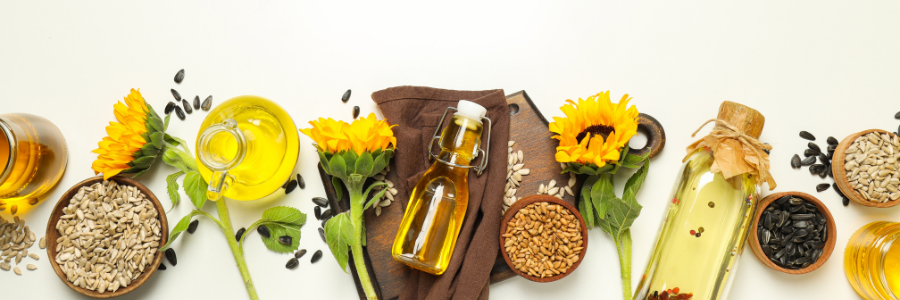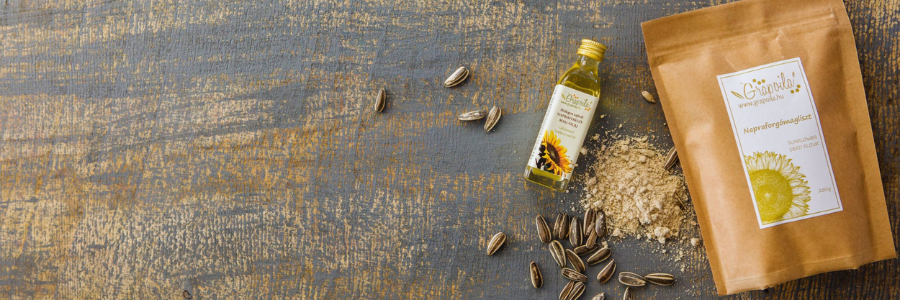
- Do you consume oily seeds?
- Well. rarely.
- If so, what do you usually eat?
- Most often pistachios, cashews, and occasionally salted peanuts or sunflower seeds.
This is approximately the attitude towards oily seeds among adults in Hungary today. And what about the elderly? They primarily consume walnuts, but many avoid them due to past gallbladder surgery or other interventions. Some think they cause bloating, or due to diverticulitis, they refrain from consumption, although these concerns are not necessarily justified in the long run.
The sunflower plant
Sunflower (Helianthus annuus) belongs to the Asteraceae family and originates from North America. Oil pressing began in the 1700s, initially used for industrial purposes such as paint and soap production. From the mid-1900s, it became widespread in cooking oil production, currently ranking fourth among globally used oils. Sunflower seeds offer versatility: sprouted for salads or bread toppings, dry-roasted, or used in oil.

They can be sprinkled on salads, soups, or stews, used in both sweet and savory dishes, turned into pesto, seed butter, or even sunflower honey. And, of course, there’s the well-known sunflower oil.
In the case of a Whole Food Plant-Based (WFPB) diet, the consumption of plant oils is not recommended; only the whole, natural seeds are advised. It is true that the less processed a raw material is, the less its nutritional value is compromised, making it richer in micro and macronutrients.
But there are huge differences between vegetable oils depending on how they are produced.
► Cold-pressed seed oil, due to its gentle technology, remains a valuable source of nutrients such as fatty acids, antioxidants, minerals, and vitamins.
► Styrian or warm pressing involves low-temperature roasting for enhanced flavor, followed by mechanical pressing, a relatively gentle method.
► Extraction processes (refined oils) significantly alter the nutritional content of the raw material. Large-scale production will never be as healthy and sustainable as, for example, Grapoil’s cold pressing paired with zero waste technology. In industrial refined oil production solvents (mostly hexane) are used to extract as much oil as possible from the seeds. Although the harmful substance is removed at the end of the process (hexane has a lower boiling point than oil, making it easy to extract), refined vegetable oils are filtered, removing valuable health-promoting compounds like antioxidants and other phytonutrients. This filtering, however, enables them to withstand long heating (deep-frying) without producing carcinogenic substances. So, we definitely do not recommend industrial oils, but we do promote oils. Why? Because they provide numerous valuable nutrients to our bodies.
The unique, rich flavor and diverse use of oils are integral to healthy eating. The healthiest meal is one that brings joy in preparation and satisfaction in consumption. Oils contribute to this.
- Add a spoonful of oil to hummus made with sunflower seed tahini,
- let a small spoon of oil glisten on vegetable cream soup,
- create various herb-infused oils to enrich simple mashed potatoes or oven-baked fries, or enhance a savory oatmeal breakfast.

Not to mention that for many, excessive fiber intake, especially in certain life situations like inflammatory bowel disease, can lead to bloating. Unrefined plant oils, however, allow us to incorporate valuable fatty acids and micronutrients from seeds without the fiber burden.
If I could, just like a doctor prescribes blood pressure medication, as a dietitian, I would prescribe 1-2 tablespoons of oily seeds daily! And speaking of hypertension: when recommending seeds, we specifically mean the unsalted versions. As much as seeds protect the cardiovascular system, an excess of salt from salted seeds can be unhealthy. Over time, increased water retention due to excess salt can expand blood volume, dilate blood vessels, and make vessel walls less flexible, requiring the heart to exert more effort to maintain proper circulation.
Nutritional composition of sunflower seeds
Macronutrients (carbohydrates, protein, fat)
- Sunflower seeds are a rich source of protein, containing almost as much protein (around 20g) per 100g as chicken breast (around 22g). However, due to their higher oil content (nearly 50g), moderation is recommended. They are a significant plant protein source, essential for both vegans and those consciously reducing meat consumption.
- The “abundant” fatty acids in sunflower seeds consist of 80-85% health-promoting unsaturated fats (44% monounsaturated, 56% polyunsaturated).
- The prominent unsaturated fatty acids include oleic acid (C18:1, ω-9) and essential linoleic acid (C18:2, ω-6). Further exploration into these unique fatty acids will be the subject of a future article.
- With low carbohydrate content (~10g/100g), sunflower seeds are a viable option for those with diabetes, as this small amount is slowly absorbed.
- The high content of complex carbohydrates or fiber (80%) aids in balancing blood sugar levels, protecting the circulatory system, and supporting proper bowel movement. In terms of fiber content, all oily seeds perform exceptionally well.
Micronutrients (vitamins, minerals, trace elements, antioxidants)
Rich in potassium (~650mg/100g), sunflower seeds contribute to cardiovascular protection. Magnesium (325mg/100g) is also present, commonly taken synthetically for muscle cramps. They contain immune-boosting zinc (5mg/100g) and are an excellent source of the antioxidant vitamin E. Listing all the antioxidants, vitamins, and minerals in sunflower seeds would be exhaustive, but they reduce the risk of numerous civilization-related diseases by being rich in polyphenolic compounds. Importantly, these valuable phytonutrients in sunflower seeds are most effective when used preventatively—regular consumption rather than sporadic or only in times of trouble. As a dietitian, I always include seeds and oils in gift packages for friends and family.

Sunflower Seed Flour
In today’s world, it’s a somewhat frustrating dynamic that unnecessarily demonizes raw materials and replaces them with more expensive alternatives that, while sounding fancy, do not serve our purpose (e.g., using almond flour instead of regular flour for a diet, which is not only double the calories but also four times more expensive, consuming our wallets rather than ourselves).
Sunflower seed flour is recommended for several reasons. Not as a complete replacement for wheat flour, as everything would taste like sunflower seeds, but because it’s an excellent fortifier, high in protein, and adds variety due to its unique flavor.
Since this flour is a byproduct of oil production, it automatically has less fat (around 12% instead of 50%) because the oil is first pressed out of the seeds, and the remaining dry matter (called pellet) is ground into flour. It has virtually no carbohydrates (very little and slow-absorbing), making it suitable for use by diabetics to slow down the absorption rate of carbohydrates in a dish.
Sunflower seed flour, though called “flour,” doesn’t require the same cooking or baking processes as wheat flour. It can be easily added to oatmeal, fruit smoothies, or plain yogurt.

Personal Favorite Note:
One of the reasons I love sunflower seeds is their easy preparation and kitchen use. You can easily process the soft little seeds with a common kitchen chopper or stick blender; no need for expensive and professional tools, making it an environmentally conscious product.
Summer Allergy Information: For those with ragweed allergies, sunflower seeds might act as an allergen or trigger. However, if you haven’t identified such an issue before, you can consume them with confidence.
Common Objection or Valid Observation:
“But oily seeds, oils, and flours are expensive!” Our perspective is that something is only expensive if it doesn’t provide value! Furthermore, these expensive oils and seeds become affordable when consumed in moderation.
This explanation ties into the fact that there’s no such thing as healthy or unhealthy food; these categories don’t exist. If we eat too many sunflower seeds, regardless of whether we overindulge in ice cream, oily seeds, or meat, the excess energy is stored as fat and increases fat deposits, not muscle mass.
You’ll often hear in our posts that the “gluten-free” label on Grapoila products is not a trend but a guarantee that any contamination is eliminated. This is not just for fashion or mild sensitivity but is crucial for those with a genuine autoimmune condition like celiac disease.
Listen to the Sunflower Seed Podcast now available on our YouTube channel!


